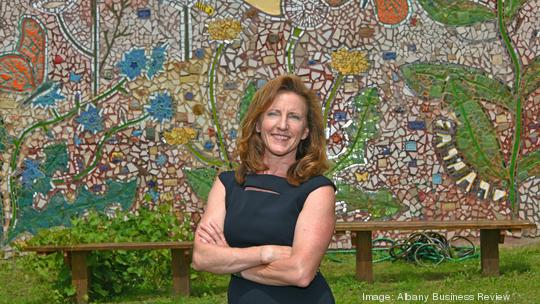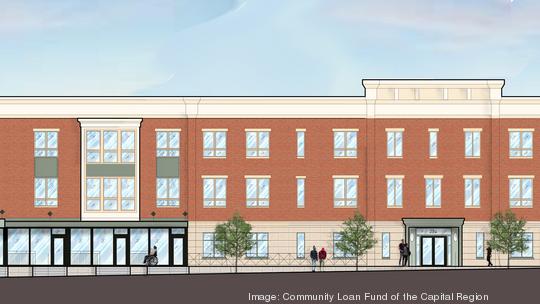
The Community Loan Fund of the Capital Region is preparing to begin construction in the next several months on an $11.2 million building that will include an expansion of its startup incubator.
Construction had been slated to begin this fall, but plans were pushed back because of the pandemic, said Linda MacFarlane, executive director of the organization.
Of the total cost, $4.25 million is going toward commercial space inside the four-story, 54,000-square-foot building on Clinton Avenue in Albany. The top two floors will include apartments for low-income renters in partnership with Home Leasing, an affordable housing developer based in Rochester.
The loan fund's existing incubator space houses 10 minority- and women-owned businesses. The additional space will allow the incubator to host roughy 22-35 additional startups, MacFarlane said. The new space will include three retail spaces for members.
"We actually have a long waiting list for those three spaces because we're going to have display windows in them," MacFarlane said. "There's a real need for that in the community."

The incubator provides low rent that increases as the startups become more successful. Among its services, the incubator also provides a variety of training classes and workshops.
The Business Review spoke with MacFarlane about the role of the loan fund's incubator in the Capital Region.
Why do you see such a need for an incubator dedicated to minority- and women-owned businesses in the Capital Region? Nationally, we're hearing all sorts of stories, and it's come more to the forefront since Covid. It's brought real attention to a problem nationally where minority- and women-owned businesses, but primarily minorities, are approved less often than white-owned businesses. They are approved for lower dollar amounts and approved at higher rates of interest. The Community Loan Fund has always focused on equitable financing and looking at groups that are not able to be financed through traditional financial institutions. There's a real need for startup businesses, in particular minority- and women-owned, to be looked at on their own and to be looked at in a fair and equitable way, and that's what we are able to do.
What role do you see these businesses having in their communities? In our incubator now, we have a minority-owned construction company, and we have financed minority- and women-owned construction companies. So they are certainly in demand. Those types of businesses we enjoy funding because they're going to be supporting community development.
And then we have businesses that not only are producing something but are also assisting the communities. We have a videographer who takes photographs but also spends a lot of time in the community showing youth what this business means and how to get involved in it. The construction company that's in our building spends time in construction training programs and works with people who are at risk. We have a company that now works with a land bank and cleans out properties. And that individual brings in at-risk young people and trains them.
When you ask about silos, I think the difference is a lot of our borrowers, whether they're in the building or not, are very community-minded. They're opening up businesses in the community, and they are wanting to support local communities. They hire from within the communities when they can. They want to sustain the community. They want to see community development, but they want it to last. The business we work with, I think really give back a lot more.
What ways did CLF and the incubator help during the pandemic? We initially had a grant program for small businesses, and then we worked with various municipalities to help administer their grant programs for Covid relief funding to small businesses in communities. What we found was they did not want emergency loans. Taking on additional debt was not where they wanted to be. After George Floyd, and there was Black Lives Matter, which was so very important — unfortunately, there were some riots that impacted some of our Albany business locations. All of those challenges were real and very scary for business owners, so we worked on two fronts. One was the grant programs. Secondly, we put a lot of information and workshops and training information on our website. Those two things were critically important.
Interview has been edited and condensed.



